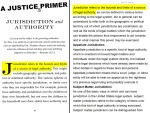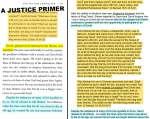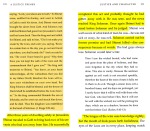2016 was a very interesting year. As I compiled the following list of my top posts for the year, I reflected on the hot topics. Doug Wilson and plagiarism was again in the top 10, although a different set of books from 2015. Not surprisingly, several Trinity debate posts also made it to the top 10. I’m so thankful for all those who spoke up to defend Trinitarian orthodoxy. There is still much work to be done.
Thank you all for your support and encouragement. May God bless you all this year.
10. A Reflection and Some Lingering Concerns after the RTS Trinity Conference
This continued insistence on ESS/EFS/ERAS by Grudem and Ware worries me for both complementarianism in general and CBMW in particular. And for these reasons I was not as reassured by Ligon Duncan’s talk as I would have liked to have been. I am extremely glad to hear that both Dr. Duncan and RTS are Pro-Nicene, but that really wasn’t in doubt, was it?
9. “Rules for Thee and Not for Me”
These are merely six examples, one from each volume. Each of these examples is mostly word for word. None of these are from open sources like Wikipedia. The only difference between the Omnibus examples and the Driscoll ones is that there are more of them from the Omnibus. I’m honestly not sure why the “rules” that applied to the Driscoll plagiarism don’t apply to the Omnibus.
In The Grand Design, Strachan and Peacock ground their understanding of the complementarity of men and women on a relationship of authority and submission in the nature of the Trinity. The result does damage to the doctrine of the Trinity, distorts the gospel, and damages the understanding of men and women and how they should interact.
7. Tim Keller, Redeemer City to City, and the Rise Campaign
Why do Keller and Redeemer want to plant churches and train leaders? To see New York City flourish:
We’re doing this for our city. Our longing is to see New York—and everyone in it—flourish. We believe the best way to serve the city is to embody the gospel in every neighborhood. The gospel doesn’t just change individual lives; it advances the common good. The increase in philanthropy, mercy, justice, racial reconciliation, integrity, and hope that occurs when more and more people live out the gospel is good for all of society, not just the body of Christ.
6. Wilson’s Influence on “Classical Christian Education”
Doug Wilson’s views on theology, history, slavery, patriarchy, marriage, sex, etc. are present in materials that many CCE schools, programs, and homeschools use. In doing my research, I focused on the six-volume Omnibus produced by Veritas Press. Veritas Press is owned by Marlin and Laurie Detweiler who were members of Wilson’s CREC denomination.
5. CBMW’s Blog Series on the Eternal Subordination of the Son
In my previous article on CBMW and the Eternal Subordination of the Son, I gave many examples of why it’s not accurate to say that CBMW is neutral in the current debate. But it is also not accurate to say that CBMW only has the one post on the Trinity. A quick search on CBMW’s website for “eternal subordination” will return a number of hits. There are several posts responding to or reviewing books by egalitarians who have written against ESS/EFS/ERAS. There is also an interesting series of posts specifically on the Eternal Subordination of the Son.
Let me take these one by one. First, of the almost 70 original sources cited in my post, fewer than 20 of them are from Wikipedia or other “open source” sites. When I cited Wikipedia as the source, I was careful to use the Internet Archive: Wayback Machine to verify that the Wikipedia information existed before the publication of each Omnibus volume. You can click on any of the Wikipedia links to take you to the archived page from a particular date that is older than the Omnibus publication date. So, unless time travel is an option, the Wikipedia sources predate the Omnibus volumes.
3. A Justice Primer: The Investigation
Before I published my article on the plagiarism, I presented my findings to 5 seminary and university professors. I wanted to know what they thought of the significance of what I’d found. All of them said it was plagiarism. They said that if they had done it, they would have been in trouble with their university/seminary/academic community. They also said that if one of their students had done the same the student would face disciplinary action including expulsion. Plagiarism is serious business.
2. Eternal Subordination of the Son and the ESV Study Bible
Given the recent debate over ESS/EFS/ERAS, I thought it would be worthwhile to demonstrate the influence this teaching has had in possibly unexpected places. The following are quotes from the ESV Study Bible study notes on various Bible passages. The page numbers are from the ebook version. The Scripture passages are all from the ESV translation.
As these example show, the plagiarism in the Omnibus volumes is extensive and pervasive. These are only a small portion of the more than 100 instances I found.








































